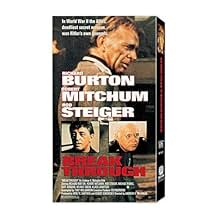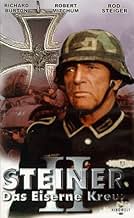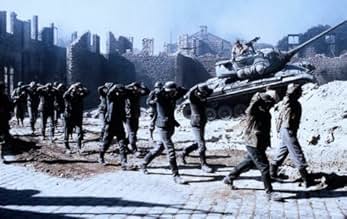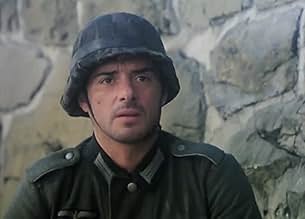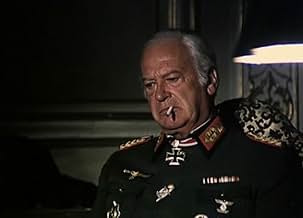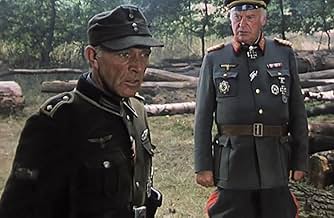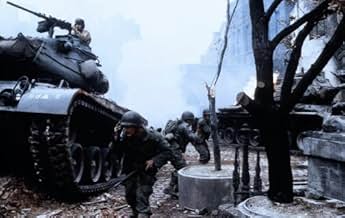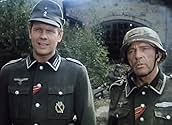Breakthrough - Specchio per le allodole
Titolo originale: Steiner - Das Eiserne Kreuz, 2. Teil
VALUTAZIONE IMDb
5,0/10
1531
LA TUA VALUTAZIONE
Aggiungi una trama nella tua linguaIn 1944 a German sergeant gets involved in an anti-Hitler conspiracy, and saves the life of an American colonel.In 1944 a German sergeant gets involved in an anti-Hitler conspiracy, and saves the life of an American colonel.In 1944 a German sergeant gets involved in an anti-Hitler conspiracy, and saves the life of an American colonel.
Véronique Vendell
- Yvette
- (as Veronique Vendell)
Michael Büttner
- Schütze Junghans
- (as Wolfgang Büttner)
Trama
Lo sapevi?
- QuizRobert Mitchum recalled that Richard Burton was drinking very heavily during filming and sometimes had to be carried onto the set.
- BlooperThey went to the trouble to get a lot of things right, from the German artillery pieces to the T-34 tanks. Even the German trucks are mostly right. They didn't necessarily do such a good job on the colors. That Kubelwagen in the dark-gray color scheme is anachronistic for the period. But then we come to the aircraft. I was taken aback to see U.S. Navy Corsairs dropping bombs on the Eastern Front. And what are all those Heinkel 111s doing in the air on D-Day?
- Citazioni
Sgt. Rolf Steiner: NCOs cannot resign.
- Versioni alternativeA longer German language version runs at 126 minutes, extra scenes includes:
- An opening scene that starts at the railway station, Rolf Steiner and Paul Anselm meet again and discuss their current predicament. Captain Stransky appears out of the station building and sends Steiner and Anselm to check out a railway tunnel down the line. Steiner and Anselm meet up with Corporal Kruger before returning to the station. (8mins approx)
- When Steiner returns to German lines, the scene where he meets his new platoon is longer and includes introductions to new comrades Rothe, Dorfmann and Keppel.
- An extended scene between Yvette and Steiner at her apartment.
- Steiner is mocked by an old woman as he leaves Yvette's apartment.
- The two orphaned children Steiner looks at, at the end turn up earlier and throw rocks at Steiner.
- The final battle is extended, there is more footage of the American GIs attacking the town, the American tanks cause greater damage to the town. Steiner shoots GIs whilst trying to defend the townspeople.
- ConnessioniFeatures La croce di ferro (1977)
Recensione in evidenza
A film can usually be judged on its own merits. But a film claiming to be a sequel to Peckinpah's "Cross of Iron" and featuring some of the greatest actors who ever lived needs to be held to a high standard. "Breakthrough" is a waste of time and fails in virtually all departments.
The plot cannot be taken seriously. It begins in late May of 1944, during the German retreat on the Eastern Front. "Cross of Iron" is set in January of 1943, yet our sequel begins where it left off, yet it's almost 16 months later. We are immediately introduced to several familiar characters, none of whom seem to measure up with their personalities from the original film. Sergeant Steiner (Richard Burton) is ordered by Captain Stransky (Helmut Griem) to blow up a railroad tunnel in order to prevent the Russians from using it. Steiner's squad fails miserably. Stop again: Coburn's Steiner was a crack NCO. He wiped out several different Russian outposts, patrols and tanks with style. It's out of character for Steiner to be defeated to easily by one lousy Russian tank. Anyway: Steiner takes a breather in Paris, right as the Allies land in Normandy. His unit is transported to France, where they occupy the village of St. Bologne. General Hoffman (Curd Jurgens) appears and orders Steiner to cross the enemy lines and inform the American commanders (Robert Mitchum and Rod Steiger) that the German high command is plotting to assassinate Hitler and would like to surrender. This plan comes undone, and the American forces move to attack St. Bologne which Stransky has planned to blow up a plot which will wipe out the attackers and the civilian inhabitants.
That's quite a bit to cram into one film, and McLaglen doesn't seem to know where he's going with this material. This is a very open-ended film, with little to link the sequence of events except pure coincidence. The script is serviceable on its own, but nothing here compares to "Cross". For starters, this new film ignores the last ten minutes or so of "Cross" and picks up right after the death of Lt. Triebig. Steiner appears to have no remorse against Stransky and, along with Kruger (Klaus Lowitsch) and Anselm (Dieter Schidor), joins the retreating force. Burton's portrayal of Steiner is simply unacceptable. For one thing, he's a bit too old and haggard to be considered a combat sergeant. He never gets involved in any physical action for this exact reason. Instead, he merely delivers dialog with a phony German accent and kills just as many Americans as fellow Germans as he seems confused as to whose side he's on. Unlike Coburn's Steiner, Burton's fails to stand for anything: he is loyal to his men, but winds up killing several of them in order to keep a promise to Colonel Rogers (Mitchum).
The film also fails miserably because, despite a slew of Hollywood legends and some familiar German actors, the acting is banal and limited. Mitchum and Steiger are both wasted in mediocre roles as American officers. Steiger's part is particularly disappointing, as he always seems sincere but isn't given very much to work with. The only American actor in the ensemble who seems properly placed in Michael Parks in a small but seemingly-enjoyed role as Sgt. Anderson, who tags along with Mitchum on various dangerous outings. Dare I forget to mention the presence of the legendary Curd Jurgens, who gets little to do here but plays his typical typecast role of an aristocratic German General with gusto despite his obviously forced surroundings!
The cast is chock full of German supporting actors, all of whom are forced into roles beneath their acting ability. Helmut Griem ("The McKenzie Break") is a pretty sorry stand-in for Maximilian Schell. He sure seems interested in getting his Iron Cross, but theme is reduced to an occasional reference or gag. The new Stransky is nothing more than a typical, one-dimensional Nazi out for American blood. Klaus Lowitsch is back and is a lot of fun as Corporal Kruger, although his character has changed, too: now he's wearing a German uniform and it's hard to tell is his cynicism is sincere. Werner Pochath ("Wartime") is a predictable pervert amongst the ranks of Steiner's squad; Gunter Meisner ("Is Paris Burning?") pops up in his usual role as a creepy SS officer; Horst Janson ("Shout at the Devil") is completely wasted as Steiner's company commander; even Joachim Hansen ("The Eagle has Landed") has a minimal role as Hoffman's aide. This film yearns for James Mason and David Warner, whose characters are simply forgotten in the midst of the chaos.
On its own, "Breakthrough" still fails to make any sort of impression. The lack budgetary restrictions show up in nearly every frame. The first few scenes are composed almost entirely of stock footage from "Cross of Iron" and "The Battle of Neretva", while the rest feature a tremendous lack of extras and flair. We rarely see more than half-dozen actors on screen at one time, and the battle in the St. Bologne uses many of the same shots more than once, alternate takes of some shots, and some rather shabby soundstages. The direction always seems pretty standard and unimaginative; McLaglen, who's usually at least a competent director, doesn't take any chances in this film. Nothing happens that we haven't seen before, and the lack of flair makes the whole affair seem even more pedestrian. The music score is ill-fitting and badly written. It's composed mostly of symphonic cues which belong in a spaghetti western or perhaps one of Antonio Margheriti's early sci-fi adventures but certainly not an anti-war film! Fans of the cast will be disappointed. Fans of its predecessor will be severely disappointed. It's even a let-down for me, and I consider myself a pretty opened-minded war film fan. Don't even bother with this one.
The plot cannot be taken seriously. It begins in late May of 1944, during the German retreat on the Eastern Front. "Cross of Iron" is set in January of 1943, yet our sequel begins where it left off, yet it's almost 16 months later. We are immediately introduced to several familiar characters, none of whom seem to measure up with their personalities from the original film. Sergeant Steiner (Richard Burton) is ordered by Captain Stransky (Helmut Griem) to blow up a railroad tunnel in order to prevent the Russians from using it. Steiner's squad fails miserably. Stop again: Coburn's Steiner was a crack NCO. He wiped out several different Russian outposts, patrols and tanks with style. It's out of character for Steiner to be defeated to easily by one lousy Russian tank. Anyway: Steiner takes a breather in Paris, right as the Allies land in Normandy. His unit is transported to France, where they occupy the village of St. Bologne. General Hoffman (Curd Jurgens) appears and orders Steiner to cross the enemy lines and inform the American commanders (Robert Mitchum and Rod Steiger) that the German high command is plotting to assassinate Hitler and would like to surrender. This plan comes undone, and the American forces move to attack St. Bologne which Stransky has planned to blow up a plot which will wipe out the attackers and the civilian inhabitants.
That's quite a bit to cram into one film, and McLaglen doesn't seem to know where he's going with this material. This is a very open-ended film, with little to link the sequence of events except pure coincidence. The script is serviceable on its own, but nothing here compares to "Cross". For starters, this new film ignores the last ten minutes or so of "Cross" and picks up right after the death of Lt. Triebig. Steiner appears to have no remorse against Stransky and, along with Kruger (Klaus Lowitsch) and Anselm (Dieter Schidor), joins the retreating force. Burton's portrayal of Steiner is simply unacceptable. For one thing, he's a bit too old and haggard to be considered a combat sergeant. He never gets involved in any physical action for this exact reason. Instead, he merely delivers dialog with a phony German accent and kills just as many Americans as fellow Germans as he seems confused as to whose side he's on. Unlike Coburn's Steiner, Burton's fails to stand for anything: he is loyal to his men, but winds up killing several of them in order to keep a promise to Colonel Rogers (Mitchum).
The film also fails miserably because, despite a slew of Hollywood legends and some familiar German actors, the acting is banal and limited. Mitchum and Steiger are both wasted in mediocre roles as American officers. Steiger's part is particularly disappointing, as he always seems sincere but isn't given very much to work with. The only American actor in the ensemble who seems properly placed in Michael Parks in a small but seemingly-enjoyed role as Sgt. Anderson, who tags along with Mitchum on various dangerous outings. Dare I forget to mention the presence of the legendary Curd Jurgens, who gets little to do here but plays his typical typecast role of an aristocratic German General with gusto despite his obviously forced surroundings!
The cast is chock full of German supporting actors, all of whom are forced into roles beneath their acting ability. Helmut Griem ("The McKenzie Break") is a pretty sorry stand-in for Maximilian Schell. He sure seems interested in getting his Iron Cross, but theme is reduced to an occasional reference or gag. The new Stransky is nothing more than a typical, one-dimensional Nazi out for American blood. Klaus Lowitsch is back and is a lot of fun as Corporal Kruger, although his character has changed, too: now he's wearing a German uniform and it's hard to tell is his cynicism is sincere. Werner Pochath ("Wartime") is a predictable pervert amongst the ranks of Steiner's squad; Gunter Meisner ("Is Paris Burning?") pops up in his usual role as a creepy SS officer; Horst Janson ("Shout at the Devil") is completely wasted as Steiner's company commander; even Joachim Hansen ("The Eagle has Landed") has a minimal role as Hoffman's aide. This film yearns for James Mason and David Warner, whose characters are simply forgotten in the midst of the chaos.
On its own, "Breakthrough" still fails to make any sort of impression. The lack budgetary restrictions show up in nearly every frame. The first few scenes are composed almost entirely of stock footage from "Cross of Iron" and "The Battle of Neretva", while the rest feature a tremendous lack of extras and flair. We rarely see more than half-dozen actors on screen at one time, and the battle in the St. Bologne uses many of the same shots more than once, alternate takes of some shots, and some rather shabby soundstages. The direction always seems pretty standard and unimaginative; McLaglen, who's usually at least a competent director, doesn't take any chances in this film. Nothing happens that we haven't seen before, and the lack of flair makes the whole affair seem even more pedestrian. The music score is ill-fitting and badly written. It's composed mostly of symphonic cues which belong in a spaghetti western or perhaps one of Antonio Margheriti's early sci-fi adventures but certainly not an anti-war film! Fans of the cast will be disappointed. Fans of its predecessor will be severely disappointed. It's even a let-down for me, and I consider myself a pretty opened-minded war film fan. Don't even bother with this one.
- SgtSlaughter
- 24 set 2002
- Permalink
I più visti
Accedi per valutare e creare un elenco di titoli salvati per ottenere consigli personalizzati
- How long is Breakthrough?Powered by Alexa
Dettagli
- Data di uscita
- Paese di origine
- Lingue
- Celebre anche come
- Breakthrough
- Luoghi delle riprese
- Aziende produttrici
- Vedi altri crediti dell’azienda su IMDbPro
- Tempo di esecuzione1 ora 51 minuti
- Mix di suoni
- Proporzioni
- 1.66 : 1
Contribuisci a questa pagina
Suggerisci una modifica o aggiungi i contenuti mancanti

Divario superiore
What is the French language plot outline for Breakthrough - Specchio per le allodole (1979)?
Rispondi
